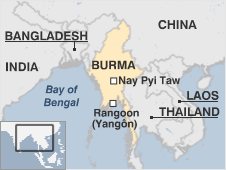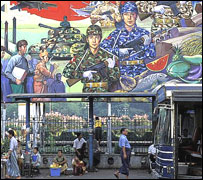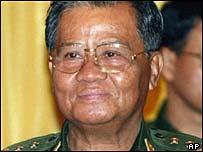
|
The generals and the army stand accused of gross human rights abuses, including the forcible relocation of civilians and the widespread use of forced labour, which includes children.
Overview
A popular uprising was forcibly crushed in 1988 and mass demonstrations were not seen again until 2007, when a small string of protests about living standards gained momentum among a public normally too cowed to voice any dissent.
|
|
AT-A-GLANCE

Politics:
Burma
has
been
under
military
rule
since
1962;
the
regime
stifles
almost
all
dissent
Economy:
Burma
is
one
of
Asia's
poorest
countries;
its
economy
is
riddled
with
corruption
International:
Burma
is
seen
as a
pariah
state
by
the
West,
which
maintains
sanctions;
China
is
its
main
ally
|
Prominent pro-democracy leader and Nobel Peace Prize winner, Aung San Suu Kyi, has had various restrictions placed on her activities since the late 1980s.
Her party, the National League for Democracy, won a landslide victory in 1990 in Burma's first multi-party elections for 30 years, but has never been allowed to govern.
Military-run enterprises control key industries, and corruption and severe mismanagement are the hallmarks of a black-market-riven economy.
The armed forces - and former rebels co-opted by the government - have been accused of large-scale trafficking in heroin, of which Burma is a major exporter.
The largest group is the Burman people, who are ethnically related to the Tibetans and the Chinese. Burman dominance over Karen, Shan, Rakhine, Mon, Chin, Kachin and other minorities has been the source of considerable ethnic tension and has fuelled intermittent separatist rebellions.
Military offensives against insurgents have uprooted many thousands of civilians.
A largely rural, densely forested country, Burma is the world's largest exporter of teak and a principal source of jade, pearls, rubies and sapphires. It is endowed with extremely fertile soil and has important offshore oil and gas deposits. However, its people remain very poor and are getting poorer.
Activists argue that French oil interests fuel oppression by co-operating with the junta in a joint venture to exploit gas. They allege that France has been blocking tough European Union sanctions against the military.
The country is festooned with the symbols of Buddhism. Thousands of pagodas throng its ancient towns; these have been a focus for an increasingly important tourism industry.
But while tourism has been a magnet for foreign investment, its benefits have hardly touched the people.
Facts
- Official name: Union of Myanmar
- Population: 50 million (UN, 2009)
- Capital: Nay Pyi Taw
- Largest city: Rangoon (Yangon)
- Area: 676,552 sq km (261,218 sq miles)
- Major languages: Burmese, indigenous ethnic languages
- Major religions: Buddhism, Christianity, Islam
- Life expectancy: 59 years (men), 63 years (women) (UN)
- Monetary unit: 1 kyat = 100 pyas
- Main exports: Teak, pulses and beans, prawns, fish, rice, opiates, oil and gas
- GNI per capita: not available
- Internet domain: .mm
- International dialling code: +95
Leaders
Head of state: Than Shwe, chairman of the State Peace and Development Council (SPDC)
Senior General Than Shwe is the country's top military leader and heads the SPDC, the body of 12 senior generals that runs the country and makes the key decisions.

Than
Shwe,
a
one-time
specialist
in
psychological
warfare
|
He has steadfastly ruled out a transfer of power to Aung San Suu Kyi's National League for Democracy (NLD).
In 1993 he established the National Convention, a reconciliation process aimed at drawing up a new constitution.
After more than 15 years of deliberations boycotted by the NLD, the government in 2007 declared the process over and published a new constitution, with multi-party elections scheduled for 2010.
Critics said that, rather than ushering in genuine political change, the new basic law cemented the military's political dominance.
The new constitution reserves a quarter of seats in both houses of parliament for officers, and effectively bars Aung San Suu Kyi from holding office.
Born in 1933 near the town of Mandalay, Than Shwe joined the army at the age of 20. His career included a stint in the department of psychological warfare. He was decorated more than 16 times during his career as a soldier.
He is said to be introverted and superstitious, frequently seeking the advice of astrologers.
Reports in early 2007 said the 73-year-old had sought treatment in Singapore for an undisclosed medical condition.
Power struggles have plagued Burma's military leadership. Prime Minister Khin Nyunt was sacked and arrested in 2004. The former premier, who said he supported Aung San Suu Kyi's involvement in the National Convention, was seen as a moderate who was at odds with the junta's hardliners.
Media
The Burmese media have been strictly controlled since the 1962 military coup. Everything from poetry to films is censored, filtering not only criticism of the government but most bad news, including reports of natural disasters and sometimes even defeats by the national football team.
The state controls the main broadcasters and publications. Print and broadcast media are dominated by formulaic reports on the daily official and religious ritual activities of the ruling generals, accounts of progress in the implementation of policies, and denunciations of alleged US and UK plots against Burma.
Foreign radio is a key source of information about both the outside world and events at home. The BBC, Voice of America, the US-backed Radio Free Asia and the Norway-based opposition station Democratic Voice of Burma target listeners in Burma.
Well-off Burmese have access to some international television and a limited number of international publications.
Paris-based media watchdog Reporters Without Borders has placed Burma among the bottom 10 countries in its world press freedom ranking. It says the press is subject to "relentless advance censorship".
Internet access is tightly controlled by the government. It is further hampered by a poor telephone infrastructure and an unreliable supply of electricity. Reporters Without Borders calls Burma a "black hole" whose system "increasingly resembles an intranet as more and more foreign electronic services have been cut".
The press
- Kyehmon - state-run daily
- Myanmar Alin - organ of State Peace and Development Council (SPDC)
- New Light of Myanmar - English-language organ of SPDC
- Myanmar Times - state-run English-language weekly
Television
- TV Myanmar - state-run, operated by Myanmar TV and Radio Department - broadcasts in Bamar, Arakanese (Rakhine), Shan, Karen, Kachin, Kayah, Chin, Mon and English
- MRTV-3 - state-run international TV service
- Myawady TV - army-run network
- TV5 - state-private joint pay-TV venture
Radio
- Radio Myanmar - state-run, operated by Myanmar TV and Radio Department
- City FM - entertainment station operated by Rangoon City Development Committee
- Democratic Voice of Burma - opposition station based in Norway, broadcasts via shortwave
News agency/internet
- Myanmar News Agency (MNA) - state-run
-
Mizzima News - run by Burmese exiles
AFRICA
|
ASIA-PACIFIC
|
AMERICAS
|
EUROPE
|
MIDDLEEAST |
SOUTHASIA![]()
![]()
![]()
![]()
![]()
![]()
Mauritania
Mauritius
Morocco
Mozambique
Namibia
Niger
Nigeria
Republic-of-congo
Rwanda
Sao-tome-and-principe
Senegal
Seychelles
Sierra-leone
Somalia
South-africa
Sudan
Swaziland
Tanzania
The-gambia
Togo
Tunisia
Uganda
zambia
Zimbabwe
Australia
Brunei
Burma
Cambodia
China
East-timor
Fiji
Indonesia
Japan
Kazakhstan
Kiribati
Kyrgyzstan
Laos
Malaysia
Marshall-islands
Micronesia
Mongolia
Nauru
New-zealand
North-korea
Palau
Papua-new-guinea
Samoa
Singapore
Solomon-islands
South-korea
Taiwan
Tajikistan
Thailand
The-philippines
Tonga
Turkmenistan
Tuvalu
Uzbekistan
Vanuatu
Vietnam
Antigua-and-barbuda
Argentina
Bahamas
Barbados
Belize
Bolivia
Brazil
Canada
Chile
Colombia
Costa-rica
Cuba
Dominica
Dominican-republic
Ecuador
El-salvador
Grenada
Guatemala
GuyanaHaiti
Honduras
Jamaica
Mexico
Nicaragua
Panama
Paraguay
Peru
St-kitts-and-nevis
St-lucia
St-vincent-and-the-grenadines
Suriname
Trinidad-and-tobago
United-states-of-america
Uruguay
Venezuela
Albania
Andorra
Armenia
Austria
Azerbaijan
Belarus
Belgium
Bosnia-hercegovina
Bulgaria
Croatia
Cyprus
Czech-republic
Denmark
Estonia
Finland
France
Georgia
Germany
Greece
Hungary
Iceland
Ireland
Italy
Latvia
Liechtenstein
Lithuania
Luxembourg
Macedonia
Malta
Moldova
Monaco
Montenegro
Norway
Poland
Portugal
Russia
San-marino
Serbia
Slovakia
Slovenia
Spain
Sweden
Switzerland
The-netherlands
Turkey
Ukraine
United-kingdom
Vatican
Algeria
Egypt
Iran
Iraq
Israel-and-palestinian-territories
Jordan
Kuwait
Lebanon
Libya
Mauritania
Oman
Saudi-arabia
Sudan
Syria
Tunisia
United-arab-emirates
Yemen
Afghanistan
Bangladesh
Bhutan
India
Nepal
Pakistan
Sri-Lanka
The-Maldives


